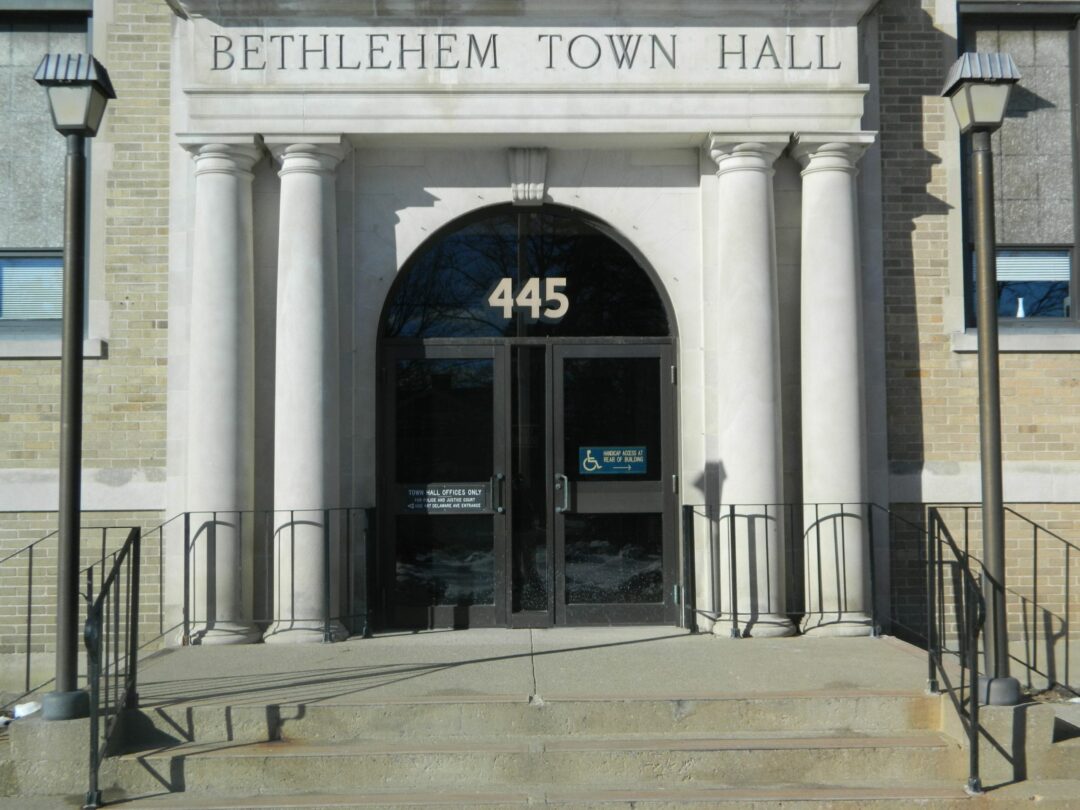Locals not connecting with prop tower
GLENMONT—A proposed cell tower near the busy intersection of Feura Bush and Wemple roads has already established a network of local residents drawn together in opposition, citing it will bar safety, drop property values, and ping the environment.
Verizon Wireless is proposing the construction of a 110-foot monopole telecommunication tower at 578 Feura Bush Road in Glenmont to address coverage gaps and improve wireless communication services in the area.
The company has identified poor and unreliable 4G and 5G network performance in a critical zone that includes the neighborhoods of Chadwick Square and Newell Place. It claims this location was selected based on a comprehensive analysis of local network needs and the absence of existing structures suitable for collocating their equipment.
The proposed facility is expected to enhance both emergency and non-emergency communication capabilities, providing reliable wireless coverage for residents, businesses, and travelers in northeastern Bethlehem.
Verizon argues that the new tower is a necessary upgrade to its infrastructure, ensuring the community has access to state-of-the-art communication services and fulfilling its mandate to expand network reliability and performance.
The proposed site, owned by the Elsmere Fire District, is zoned Residential A, where such telecommunication facilities are allowed with a special use permit and site plan approval. Verizon also seeks variances for the tower’s height and setbacks, as its location does not meet minimum distance requirements from neighboring properties and structures. The company contends that existing structures in the area are unsuitable for collocating its equipment.
“This cell tower will be clearly visible from several angles,” wrote Glenmont resident Jeff Irving. “People walking or driving on Wemple Road or Feura Bush Road will have a clear view of this tower during all the seasons.” Irving is among more than 200 residents who have declared their opposition through letters, lawn signs, and signed petitions.
Opposition to the proposal centers on concerns about the potential negative impact of the cell tower on the community. Key issues include the safety risks associated with the tower’s height and proximity to residential properties, potential health effects from radiofrequency emissions, and the visual disruption to the neighborhood’s character.
Some residents have also voiced concerns about the health impacts of 5G technology, citing the lack of long-term studies.
“5G has not been around long enough to allow for proper long-term studies, and in turn, we, the residents of Glenmont, should not be the test subjects,” wrote Glenmont resident Marisa Jaynes.
Economic concerns loom large as well, with some residents fearing that property values could drop due to the tower’s presence. An opposition letter submitted to the Planning Board cited a study from the National Association of Realtors, which found that homes near cell towers can lose up to nine percent of their value.
The environmental impact of the project has also been raised. An advocate highlighted the potential disruption to wetlands in the area, which are habitats for endangered species like the Little Brown Bat.
“Bethlehem wetlands are a critical habitat for at least one species on the NYS Endangered Species List,” wrote Lisa Irving.
The Town’s environmental review assessment started this month with a meeting of its Planning Board on Nov. 7. Many of the same concerns were voiced by several residents who spoke during public comment prior to Verizon’s presentation.
Verizon has stated that the tower will include a fenced compound and landscaping to minimize its visual impact and provide space for additional carriers. The company has also pledged to comply with federal safety standards and environmental regulations. A visual impact assessment and a balloon test to measure the tower’s visibility have been proposed as part of the approval process.
But, at the very least, the initial monopole design may be scraped, said David Brennan, an attorney from Young/Sommer LLC, representing Verizon Wireless in their application for the proposed cell tower project. He told Planning Board members that alternative designs, including a flag pole or faux conifer tree could be reviewed.



